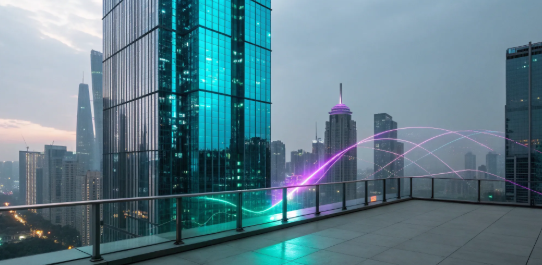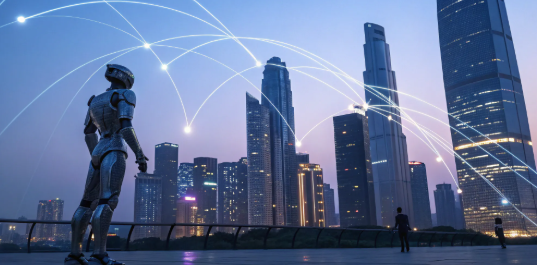Finding and hiring exceptional talent is more than just an HR function; it's a strategic advantage. The speed and efficiency of your recruitment process directly impact your ability to innovate and grow. Integrating AI gives you a powerful competitive edge. It allows you to identify and engage with top candidates faster, reduce your cost-per-hire, and access a wider, more diverse talent pool that your competitors might be overlooking. This isn't just about filling roles—it's about building a team that can drive your business forward. Leveraging this technology for a competitive advantage is one of the core benefits of an AI recruitment agency; we help you move faster and smarter, securing the talent you need to win.
Key Takeaways
- Use AI to assist, not replace, your team: The best way to use AI is as a powerful assistant that handles repetitive tasks like screening resumes and scheduling interviews. This frees up your recruiters to focus on the human side of hiring—building relationships, assessing culture fit, and making nuanced decisions.
- Make hiring faster and more data-driven: AI streamlines your entire recruitment workflow, which helps you fill roles faster and reduce your cost-per-hire. By grounding your decisions in objective data on skills and potential, you can consistently make smarter hires that strengthen your team.
- Actively manage AI to build a fairer process: While AI can help reduce unconscious human bias, it's not a magic fix. You must choose tools that prioritize skills over demographics and regularly audit their performance to ensure you're building a more diverse and equitable hiring system.
What is AI in Recruitment?
Let's clear up a common misconception: AI in recruitment isn't about handing over hiring decisions to robots. Instead, think of it as a powerful partnership between smart technology and human insight. It uses intelligent software to handle the repetitive, data-heavy parts of hiring, allowing recruitment professionals to focus on what they do best—connecting with people and making nuanced judgments. The goal is to make the entire process faster, more effective, and fundamentally fairer for everyone involved.
By automating certain tasks, AI helps companies find better candidates in less time. It can sift through thousands of applications to find the most relevant profiles, schedule interviews, and even help write more inclusive job descriptions. This isn't just about efficiency; it's about creating a better experience for both the hiring manager and the candidate. When technology handles the logistics, humans can concentrate on building relationships and ensuring a great culture fit. As a specialized AI recruitment agency, we see this collaboration as the key to building exceptional teams.
How Hiring Has Changed
Hiring used to be an incredibly manual process. Recruiters would spend countless hours reading every single resume, sorting applications, and entering data. This administrative burden slowed everything down, leading to long hiring cycles and the risk of great candidates accepting other offers. AI has completely changed this dynamic. It automates the initial screening process, instantly identifying applicants whose skills and experience align with the job requirements.
This shift allows recruiters to step away from tedious tasks and invest their time in more strategic work. They can focus on engaging with top contenders, conducting meaningful interviews, and acting as true talent advisors to their organizations. The result is a much faster process—some companies have reduced their time-to-hire by a significant margin—which saves money and secures top talent before the competition can.
The Role of AI in Modern Hiring
Today, AI's role extends far beyond just screening resumes. Modern AI tools can analyze video interviews to pick up on communication styles, help write job descriptions that attract a more diverse pool of applicants, and identify candidates based on their actual skills rather than just their previous job titles. This is especially important in technical fields where specific abilities in Machine Learning or Data Science are more telling than a particular degree.
Ultimately, AI acts as a powerful assistant, providing data and insights that help humans make better, more informed decisions. It’s not here to replace the human element of recruiting—it’s here to enhance it. The final decision always rests with a person who can assess culture fit, team dynamics, and a candidate's long-term potential in a way that an algorithm can't.
Why Use AI in Your Hiring Process?
Integrating AI into your recruitment strategy isn't just about keeping up with technology; it's about making your hiring process smarter, faster, and more effective. By automating routine tasks and providing deep, data-driven insights, AI allows your team to focus on what truly matters: connecting with the right people. Think of it as a powerful assistant that handles the heavy lifting, so you can build stronger teams and achieve your business goals. From reducing costs to improving the candidate journey, the benefits are tangible and can transform how you find and hire top talent.
Hire Faster and More Efficiently
Let's face it, a lengthy hiring process can cause you to lose out on top candidates. AI tools are designed to streamline your workflow from start to finish. They can automate time-consuming tasks like screening resumes and scheduling interviews, freeing up your recruiters to focus on more strategic work, like engaging with promising applicants. According to Helios HR, companies using AI can reduce their hiring time by up to 40%. This efficiency means you can fill critical roles faster, giving you a competitive edge in the fast-moving tech landscape. By handling the repetitive work, AI helps your team operate at its best.
Reduce Your Cost-Per-Hire
Every day a position stays open, it costs your company money. AI helps lower your cost-per-hire by making the entire process more efficient. By automating tasks like sorting applications and initial data entry, you reduce the manual hours your team spends on each opening. More importantly, AI helps you find the right fit the first time. Making a quality hire reduces employee turnover, which in turn cuts down on the significant costs associated with recruiting and training new staff. As explained by hiring experts at Harver, this leads to long-term savings and a more stable, productive workforce.
Make Smarter, Data-Backed Decisions
Gut feelings can be helpful, but data provides the clarity needed to make consistently great hires. AI moves beyond surface-level information like past job titles and focuses on what really counts: a candidate's actual skills and potential. These tools can analyze abilities and even help predict how well a candidate might perform in a role and how long they're likely to stay with your company. This is especially valuable when hiring for highly specialized roles like AI Engineers or data scientists. By grounding your decisions in objective data, you can build a team that is not only skilled but also aligned with your company's future.
Improve the Candidate Experience
In a competitive market, a positive candidate experience is non-negotiable. AI can make your application process smoother and more engaging for applicants. For instance, AI-powered chatbots can provide instant answers to candidate questions 24/7, while automated systems can send timely updates and handle interview scheduling. This level of responsiveness keeps candidates interested and shows that you value their time. A seamless, professional process reflects well on your brand and helps you attract the best talent, ensuring that top professionals have a great impression of your company from the very first interaction.
Widen Your Talent Pool
Are you sure you're seeing all the best candidates? AI can help you discover talent you might have otherwise missed. By screening applicants based on skills and qualifications alone, AI tools can reduce the unconscious bias that sometimes influences human decisions. This focus on merit can help you build a more diverse and innovative team. Furthermore, AI is excellent at identifying "passive candidates"—skilled professionals who aren't actively job hunting but would be a perfect fit for a new role. It can also re-engage past applicants from your database who are now qualified for one of your current job openings.
How AI Works in Recruitment
When we talk about AI in recruitment, we’re not talking about a single, all-powerful robot making hiring decisions. Instead, think of it as a suite of specialized tools designed to handle specific, often time-consuming, tasks within the hiring process. It’s less about replacing your hiring manager and more about giving them a powerful assistant that supercharges their abilities. By automating repetitive work and providing deep data insights, AI frees up your team to focus on the human side of hiring—building relationships, assessing cultural fit, and making those final, critical decisions. This strategic partnership between human intuition and machine intelligence is what makes modern recruitment so effective.
From sourcing and screening to interviewing and onboarding, AI tools are transforming every stage of the talent acquisition lifecycle. They can parse thousands of resumes in minutes, predict a candidate's potential for success, and even help you write more inclusive job descriptions that attract a wider, more qualified pool of applicants. For companies looking to hire specialized talent in fields like AI and Machine Learning, these tools are no longer a luxury; they're essential for staying competitive. Let's look at a few concrete ways AI is making a difference in the day-to-day work of recruitment.
Screen Resumes Intelligently
Imagine your ideal candidate is buried in a stack of a thousand resumes. Finding them is a monumental task. This is where AI excels. AI-powered screening tools use natural language processing to read and understand resumes just like a human would, but on a massive scale. They can identify key skills, years of experience, and relevant qualifications, instantly shortlisting the most promising applicants. For example, Unilever transformed its hiring process by using AI to manage two million applications annually. This change cut their hiring time from four months to just four weeks. This efficiency allows your team to spend less time on manual review and more time engaging with top-tier talent.
Predict Candidate Success
A great resume is one thing, but how can you know if a candidate will truly thrive in your company long-term? AI-powered predictive analytics helps answer that question. These tools analyze data from your current and past top-performing employees to identify the skills and experiences that correlate with success. When screening new applicants, the AI can then flag candidates who share those successful traits. Amazon uses this approach not only to pinpoint candidates likely to succeed but also to improve workforce diversity. By focusing on objective performance indicators, these data-backed insights help you build stronger, more effective teams and make hiring decisions that pay off for years to come.
Analyze Video Interviews
Video interviews have become a staple of modern hiring, and AI adds another layer of insight to the process. AI tools can analyze pre-recorded video interviews to provide a more complete picture of a candidate. Beyond just transcribing what a candidate says, this technology can assess key communication cues, such as tone of voice, speech clarity, and word choice. This gives recruiters a richer set of data points to consider alongside the candidate's answers and resume. It helps create a more consistent evaluation process and allows hiring managers to quickly get a sense of a candidate's communication style before moving to a live interview, saving valuable time for everyone involved.
Automate Candidate Communication
One of the biggest frustrations for job seekers is the "black hole" of applying—sending in an application and hearing nothing back for weeks. AI-powered chatbots and automated communication tools solve this problem, creating a much better candidate experience. These bots can instantly answer frequently asked questions, provide updates on application status, and even help schedule interviews 24/7. For instance, Hilton implemented chatbots and slashed its hiring time from 43 days down to just five. This level of responsiveness keeps top candidates engaged and shows that you value their time, strengthening your employer brand from the very first interaction.
Write Better Job Descriptions
Your job description is your first—and most important—piece of marketing to potential candidates. AI can help you get it right. Specialized AI writing assistants can analyze your job descriptions to ensure they are clear, compelling, and inclusive. These tools can identify and suggest alternatives for potentially biased language that might unintentionally deter qualified candidates from diverse backgrounds from applying. They also help optimize your posting with the right keywords, making it more likely to appear in searches on job boards. By starting with a well-crafted and inclusive job description, you attract a stronger, more diverse talent pool from the very beginning.
How AI Can Improve Workplace Diversity
Building a diverse team isn't just a social responsibility; it's a business advantage. Diverse teams are more innovative, better at problem-solving, and more connected to a wider customer base. Yet, creating a truly equitable hiring process is challenging because of a very human problem: unconscious bias. This is where AI can step in, not as a replacement for human judgment, but as a powerful tool to support it.
When used thoughtfully, AI can help standardize evaluations and focus on what truly matters—a candidate's skills and potential. It offers a way to audit and refine your hiring practices, ensuring you're giving every applicant a fair shot. By understanding how bias can creep into recruitment, you can leverage AI to build a more objective, efficient, and inclusive process. This involves recognizing our own hidden biases, using tools to counteract them, and committing to a system that prioritizes fairness from the start.
What is Unconscious Bias in Hiring?
We all have unconscious biases. They are mental shortcuts based on social stereotypes that we form without even realizing it. In hiring, these biases can cause us to unintentionally favor or penalize candidates based on factors like their name, gender, age, or alma mater, rather than their actual qualifications. For example, a recruiter might feel a natural affinity for someone who went to the same university or subconsciously associate a certain name with a specific gender or ethnicity. This isn't about being a "bad" person; it's a natural brain function that, if left unchecked, can lead to a less diverse and less qualified team. Recognizing that these biases exist is the first step toward mitigating their impact on your hiring decisions.
Reduce Bias with AI Tools
This is where AI tools can make a real difference. AI-powered platforms can be designed to ignore demographic information that often triggers unconscious bias. Instead of seeing a candidate's name, age, or photo, the system can focus exclusively on their skills, experience, and qualifications as they relate to the job description. For instance, an AI can screen resumes by looking for specific programming languages or project management experience, providing a ranked shortlist based purely on merit. This data-driven approach helps level the playing field, ensuring that every candidate is evaluated on their ability to do the job. By focusing on core competencies in fields like Data Science & Analytics, you can make sure you're assessing candidates on what truly counts.
Build a Fairer Hiring Process
Simply switching on an AI tool isn't a magic fix for diversity. Creating a truly fair process requires a thoughtful strategy and ongoing oversight. The goal is to use AI to support human decision-making, not replace it entirely. It's crucial to regularly audit your AI tools to ensure they are performing as expected and not inadvertently introducing new biases. This means working with systems that offer "explainable AI," so you can understand the logic behind their recommendations. Partnering with a specialized recruitment agency can help you implement these systems correctly, ensuring your hiring solutions are both effective and equitable. A fair process is one that is transparent, consistent, and continuously improving.
The Importance of Diverse Data
An AI model is only as unbiased as the data it's trained on. If you train an AI on your company's past hiring data, and that data reflects a lack of diversity, the AI will learn to replicate those same patterns. It might learn to prioritize candidates from certain backgrounds simply because they reflect who has been hired in the past. To prevent this, it's essential to use large, diverse datasets for training. This helps the algorithm understand what great talent looks like across a wide spectrum of people. Fairness in AI is a major focus in the industry, and ensuring your tools are built on inclusive data is fundamental to creating a system that promotes rather than hinders diversity.
Common Questions About AI in Recruitment
As AI becomes more common in hiring, it’s natural to have questions. Let's clear up some of the most frequent concerns, from whether AI will take over to how it handles sensitive information. Understanding these points will help you use AI confidently in your hiring process, whether you're building a team or looking for your next role. The key is to see AI not as a replacement for human connection, but as a powerful tool that can make hiring smarter, faster, and fairer for everyone involved.
Debunking the Myths
One of the biggest myths is that AI will make recruiters obsolete. The reality is that AI is designed to be an assistant, not a replacement. It excels at handling high-volume, repetitive tasks like sifting through thousands of resumes, which frees up recruiters to focus on what they do best: building relationships, understanding a candidate’s career goals, and assessing cultural fit. Another common concern is that AI introduces bias. While poorly designed systems can perpetuate existing biases, a well-programmed AI can actually help minimize human bias and promote more diverse and equitable hiring practices.
Finding the Balance Between AI and Human Insight
The most effective hiring strategies don't choose between AI and human recruiters—they use both. Think of it as a partnership. AI can analyze data to identify top candidates based on skills and experience, but it can’t have a conversation to gauge a person's passion or determine if they’ll thrive in your company’s environment. That’s where human insight is irreplaceable. By letting AI handle the initial, data-heavy lifting, your team can dedicate more time to meaningful interactions. This balanced approach ensures you’re making decisions based on both objective qualifications and the human elements that lead to long-term success.
Is AI Recruitment Right for Your Company?
Deciding to integrate AI into your hiring process depends on your specific needs. If your team spends a significant amount of time on manual tasks like screening resumes and scheduling interviews, AI can deliver immediate value. It speeds up the hiring cycle, which can dramatically reduce your cost-per-hire and help you secure top talent before your competitors do. However, AI isn't a one-size-fits-all solution. It requires a clear strategy and an understanding of its limitations. Working with specialized hiring solutions can help you determine which tools are right for your goals and ensure a smooth implementation.
Keeping Candidate Data Safe
When you use AI in recruitment, you're handling sensitive personal information, and protecting that data is non-negotiable. It’s essential to have clear governance policies that dictate how candidate data is collected, used, and stored, ensuring compliance with regulations like GDPR. Beyond privacy, there's the critical issue of fairness. Companies must be proactive in managing their AI tools to prevent algorithmic bias from creating unfair outcomes for candidates. This means regularly auditing your systems and ensuring the data used to train them is diverse and representative, creating a hiring process that is both secure and equitable.
How to Implement AI in Your Hiring Strategy
Bringing AI into your hiring process can feel like a huge project, but it doesn't have to be. By breaking it down into clear, manageable steps, you can build a smarter, more efficient system that helps you find the right people for your team. It’s all about being intentional and starting with a solid plan that puts your goals first. Here’s how you can get started.
Choose the Right AI Tools
The market is full of AI recruitment software, and it’s easy to get overwhelmed. The key is to focus on what you actually need. Are you looking to screen resumes faster? Or maybe you need help reducing unconscious bias in your initial review? The best tools use data-driven insights to help you make fair candidate evaluations, which is a huge step toward building a more diverse team. When you're exploring options, look for platforms that are transparent about how their algorithms work. Your goal is to find a tool that supports your recruiters' expertise, not one that makes decisions in a black box.
Define Your Goals
Before you invest in any new technology, it’s critical to know what you want to achieve. Are you trying to shorten your time-to-hire? Reduce administrative work for your team? Or improve the quality of candidates making it to the final round? AI is a powerful tool that can make recruiting faster and better, but it works best when aimed at a specific problem. Remember, the point isn't to replace your recruiters. It's to handle repetitive tasks so your team can focus on what they do best: building relationships with people. Setting clear goals from the start will guide your strategy and make it easier to measure success down the line.
Integrate AI with Your Current Systems
For AI to be effective, it needs to fit smoothly into your existing workflow. A new tool that creates extra steps or requires manual data entry will only slow your team down. Look for solutions that integrate with your current Applicant Tracking System (ATS) and other HR software. AI can handle simple tasks like writing first drafts of job descriptions, answering common questions from job seekers, and scheduling interviews. This frees up your recruiters to focus on more complex work, like talking to high-potential candidates and determining culture fit. A seamless integration is the difference between a helpful tool and a frustrating one.
Measure Your Results
Once your AI tools are up and running, it’s time to track your progress. The best part about using AI is the data it provides. You can finally get clear answers to important questions. Is your time-to-hire decreasing? Are you seeing more qualified candidates in your pipeline? Is candidate feedback more positive? AI collects data that helps you see where the process is working well and where it needs adjustments. Use these recruitment analytics to refine your approach over time. This continuous feedback loop ensures your hiring strategy keeps getting smarter, helping you consistently find and hire top-tier talent.
Key Features to Look For in AI Recruitment Software
When you start looking at AI recruitment software, the options can feel overwhelming. Every platform promises to revolutionize your hiring, but the reality is that their capabilities vary widely. To get the most out of AI, you need to know which features will make a tangible difference in your process. It’s not about having the flashiest tech; it’s about having the right tools to solve your specific hiring challenges, whether that’s sifting through a high volume of applications or identifying niche skills for a Machine Learning role.
Think of it as building a toolkit where you need a specific instrument for each job. A great AI platform combines several key functions to create a seamless, efficient, and fair hiring workflow. From the initial resume screen to the final hiring decision, the right features can save you time, reduce costs, and lead you to better candidates. Below, we’ll walk through the essential features to look for. These are the non-negotiables that separate a truly effective AI recruitment tool from a simple software program. Understanding them will help you ask the right questions and choose a solution that aligns with your company's goals.
Intelligent Resume Parsing
This feature is your first line of defense against application overload. Intelligent resume parsing uses AI to automatically scan, read, and organize information from candidate resumes. Instead of manually sifting through hundreds of documents, the software instantly extracts key details like skills, work experience, and education, then sorts candidates based on your criteria. For example, Unilever uses AI to process two million applications annually, which has cut its hiring time from four months to just four weeks. This is a game-changer for finding top AI engineering talent quickly, letting your team focus on the most promising applicants from the start.
Automated Interview Scheduling
Coordinating schedules is one of the biggest time sinks in recruitment. Automated interview scheduling acts as a personal assistant for your hiring team. The AI syncs with your recruiters' calendars and lets candidates choose an available interview slot that works for them, all without a single back-and-forth email. The system can also send automated confirmations and reminders to both the interviewer and the candidate, reducing no-shows. This simple automation frees up your recruiters' time to focus on what really matters: building relationships with candidates and evaluating their potential, which is a core part of our hiring solutions.
Predictive Candidate Matching
This is where AI gets really smart. Predictive candidate matching goes beyond simple keyword matching to analyze a candidate’s potential for success in a specific role and within your company culture. The AI learns from historical hiring data—looking at the traits of your top performers—to identify similar patterns in new applicants. Amazon, for instance, uses this to find successful candidates and improve team diversity. This data-driven approach helps you find professionals, like those in Data Science & Analytics, who not only have the right skills but are also more likely to thrive and stay with your company long-term.
Performance Analytics and Reporting
You can't improve what you don't measure. The best AI recruitment platforms include robust analytics and reporting features that give you a clear view of your entire hiring funnel. The software collects data on key metrics like time-to-hire, cost-per-hire, and which sourcing channels deliver the best candidates. This information is presented in easy-to-understand dashboards, helping you spot bottlenecks and identify what’s working well. By tracking this data, you can continuously refine your process, make smarter, data-backed decisions, and ensure your hiring strategy is as efficient as possible. For more insights, you can always check our latest news.
Data Privacy and Compliance Features
As AI becomes more integrated into hiring, ensuring data privacy and ethical use is non-negotiable. A trustworthy AI tool must have strong features to protect candidate information and comply with regulations like GDPR. Research highlights the need to address the ethical challenges in AI recruitment to prevent discrimination and misuse of data. Look for software that is transparent about how its algorithms work and provides clear controls for data management. This not only protects your company legally but also builds essential trust with the candidates you want to attract.
What's Next for AI in Recruitment?
The world of AI is moving fast, and its role in recruitment is evolving right along with it. We're moving beyond simple automation and seeing AI become a more strategic partner in the hiring process. For companies and candidates, staying aware of these changes is key to making the most of the opportunities ahead. The future isn't about replacing people; it's about creating smarter, fairer, and more effective ways to connect great talent with the right roles. This means focusing on how technology can support human decisions, not make them for us.
The Next Wave of Hiring Tech
AI is changing how companies find and hire people, making the entire process quicker and more streamlined. We're already seeing AI handle foundational tasks like drafting job descriptions, answering common questions from applicants, and scheduling interviews. This frees up recruiters and hiring managers to focus on what they do best: building relationships with candidates. By automating these repetitive steps, companies can significantly shorten their time-to-hire. This efficiency is a core part of modern hiring solutions that aim to connect talent with opportunities faster than ever before, giving your team back valuable time to spend on strategic work and connecting with top prospects.
Key Trends to Watch
Looking ahead, one of the most exciting trends is AI's ability to promote skills-based hiring. Instead of just matching keywords on a resume, advanced AI tools can analyze a candidate's actual skills and potential, looking past traditional markers like job titles or educational background. This opens the door to a more diverse and qualified talent pool. AI can also help craft job descriptions that are more inclusive and optimized to attract the right applicants. By focusing on core competencies for roles in fields like AI Engineering, companies can build stronger, more capable teams and give talented individuals a better chance to be seen for their true abilities.
How to Prepare for the Future
To get ready for what's next, companies should think strategically about where AI can add the most value. It's not about adopting every new tool, but about identifying specific challenges in your hiring process that AI can help solve. It's also essential to find the right balance between technology and the human touch. An AI can screen candidates, but a person builds rapport. A specialized recruitment partner can help you apply this technology thoughtfully, ensuring your process remains personal and effective. Understanding the nuances of different areas of expertise is something that still requires a human expert to get right.
Adopt a Mindset of Continuous Learning
Ultimately, AI is a powerful tool that should support human work, not replace it. As these technologies become more integrated into our daily workflows, a commitment to continuous learning is essential for everyone. Companies should provide training to help their recruiting teams adapt and use these new tools effectively. For candidates, it means staying curious and continuing to build skills. The goal is to create a collaborative environment where technology handles the data, and people focus on the strategy and connection. You can find more insights on our news page to stay current with industry trends.
Related Articles
- CTO Recruitment Agency AI: The Ultimate Guide
- 10 Best AI Recruitment Agencies for 2025
- AI Talent Acquisition: Your Complete Guide for 2025
- How to Build a Diverse AI Team: A Simple Guide
Frequently Asked Questions
Will an AI make the final hiring decision for a role? Absolutely not. The final decision always rests with a human. Think of AI as a powerful assistant that handles the data-heavy lifting, like sorting through applications to find candidates with the right technical skills. This frees up recruiters and hiring managers to focus on the irreplaceable human elements of hiring, such as assessing culture fit, understanding a candidate's career ambitions, and building genuine connections.
Can AI really make our hiring process less biased? It can be a powerful tool for fairness, but it isn't an automatic fix. When used correctly, AI can help reduce human unconscious bias by focusing purely on a candidate's skills and qualifications, ignoring information like name or age. However, it's critical to ensure the AI itself is built on diverse and fair data. A well-designed system supports equitable hiring, but it still requires human oversight to ensure the process is truly fair.
Is AI recruitment software only for large corporations? Not at all. In fact, smaller companies can see huge benefits. When you have a small team, every minute counts. AI tools can automate the time-consuming administrative tasks that can overwhelm a small HR department, like screening hundreds of resumes or scheduling interviews. This efficiency allows you to move faster and compete with larger companies for top talent without needing a massive recruiting team.
As a job candidate, how should I adjust my resume for AI screeners? The best approach is to be clear and specific. Make sure your resume explicitly lists your relevant skills, tools, and technical qualifications using standard industry terms. Instead of just describing your past duties, focus on concrete accomplishments and the specific technologies you used to achieve them. This helps the AI accurately identify your expertise and match you with the right opportunities.
We want to start using AI, but where do we even begin? The best way to start is by identifying your single biggest hiring challenge. Is it the sheer volume of applications? The time spent scheduling interviews? Once you know your main pain point, you can look for a specific tool designed to solve that problem. You don't need to implement a massive, all-in-one system overnight. Starting with a clear, focused goal makes the process manageable and helps you see a tangible return much faster.















